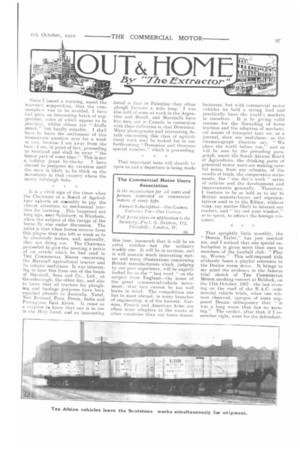UT& HOME
Page 11

If you've noticed an error in this article please click here to report it so we can fix it.
By '725 e A It is a vivid sign of the times when the Chairman of a Beard of Agriculture exhorts an assembly to pay the closest attention to mechanical traction for farming. This happened not long ago, Rear Salisbury, in Rhodesia, when the subject of the ravage of the horse fly was under discussion. The point is that when horses recover from this plague they are left so weak as to be absolutely useless, and, naturally, they are dying out. The Chairman proceeded to give the meeting a précis of an article which he had read in THE COM M MRCIAL MOTOR concerning the Marshall agricultural tractor and its infinite usefulness. It was interesting to hear this from one of the heads of Marshall, Sons and Co., Ltd., at Gainsbotough, the other day, and also to know that oil tractors for ploughing and haulage purposes have been supplied already to Australia, Natal, New Zealand, Peru, Persia, India. and Portuguese Fast Africa. It came as a surprise to know that one is in use in the Holy Land, and an interesting detail is that in Palestine they often plough furrows a mile long. I was also told of some at work in the Argentine and Brazil, and 34arsha1ls have five men out in Canada in connection with their deliveries in that Dominion. Many photographs and interesting details concerning this class of agricultural work may be looked for in our forthcoming "Dominion and Overseas special number," which is proceeding. That important issue will shortly he upon us and a departure is being made this year, inasmuch that it will be an extra numbernot the ordinary weekly one. It will be in sections, anil it will contain much interesting matter and many illustrations concerning British manufacturers which, judging by our past experience, will be eagerly looked for as the " last word " on the subject from England—the home of the great commercial-vehicle movement: that fact cannot be too well borne in mind. The competition one has to meet abroad, in many branches of engineering, is of the keenest. German, French and American firms are often more adaptive to the wants of other couutries than our home maim facturers, but with commercial motor vehicles we hold a strong lead and practically have the world's markets to ourselves. It is by giving valid reasons for the discarding of horse traction and the adoption of mechanical means of transport that we, as a journal, show our usefulness : as the cinematograph theatres say, " We place the world before you," and as will be seen by the preceding paragraph, anent the South African Board of Agriculture, the thinking parts of potential motor users are making careful notes, from our columns, of the results of trials, the comparative statements, the " one day's work " series of articles and the development and improvements generally. Therefore, I venture to he so bold as to say to British manufacturers and representatives send in to the Editor, without stint, any matter likely to interest our readers, and " lay out your window," so to speak, to attract the foreign customer. That sprightly little monthly, the " Dennis Tatler," has just reached me, and I noticed that one special exhortation is given more than once to members of the football club: "Play up, Worms." This self-imposed title evidently hears a playful reference to the Dennis worm drive. It brings to my mind the evidence in the famous trial sketch of THE COMMERCIAL Mozon smoking concert at Baldock, on the 11th Octobee, 1907--the last evening on the road of the R.A.C. commercial vehicle trials, when one witness observed, apropos of some supposed Dennis delinquency that " it was a long worm that has no turning." The verdict, after that, if I remember right, went for the defendant,




















